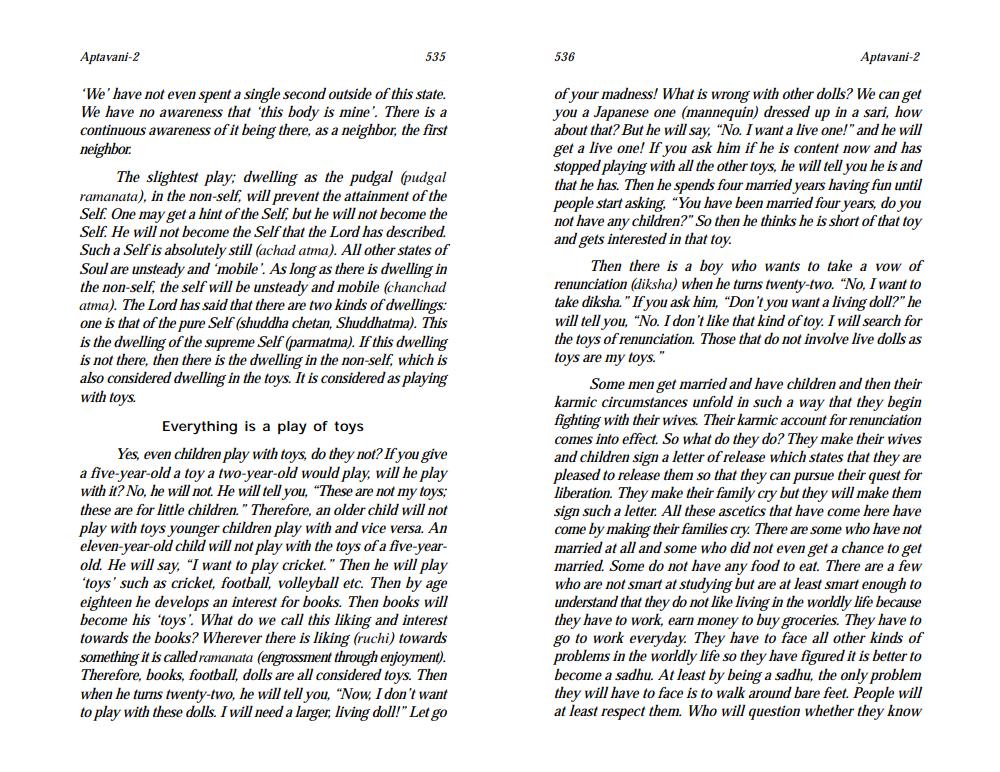________________
Aptavani-2
535
536
Aptavani-2
'We have not even spent a single second outside of this state. We have no awareness that 'this body is mine'. There is a continuous awareness of it being there, as a neighbor, the first neighbor.
The slightest play: dwelling as the pudgal (pudgal ramanata), in the non-self, will prevent the attainment of the Self. One may get a hint of the Self, but he will not become the Self. He will not become the Self that the Lord has described. Such a Self is absolutely still (achad atma). All other states of Soul are unsteady and mobile. As long as there is dwelling in the non-self, the self will be unsteady and mobile (chanchad atma). The Lord has said that there are two kinds of dwellings: one is that of the pure Self (shuddha chetan, Shuddhatma). This is the dwelling of the supreme Self (parmatma). If this dwelling is not there, then there is the dwelling in the non-self, which is also considered dwelling in the toys. It is considered as playing with toys.
of your madness! What is wrong with other dolls? We can get you a Japanese one (mannequin) dressed up in a sari, how about that? But he will say, "No. I want a live one!" and he will get a live one! If you ask him if he is content now and has stopped playing with all the other toys, he will tell you he is and that he has. Then he spends four married years having fun until people start asking, "You have been married four years, do you not have any children?" So then he thinks he is short of that toy and gets interested in that toy.
Then there is a boy who wants to take a vow of renunciation (diksha) when he turns twenty-two. "No, I want to take diksha." If you ask him, "Don't you want a living doll?" he will tell you, "No. I don't like that kind of toy. I will search for the toys of renunciation. Those that do not involve live dolls as toys are my toys.
Some men get married and have children and then their karmic circumstances unfold in such a way that they begin fighting with their wives. Their karmic account for renunciation comes into effect. So what do they do? They make their wives and children sign a letter of release which states that they are pleased to release them so that they can pursue their quest for liberation. They make their family cry but they will make them sign such a letter. All these ascetics that have come here have come by making their families cry. There are some who have not married at all and some who did not even get a chance to get married. Some do not have any food to eat. There are a few who are not smart at studying but are at least smart enough to understand that they do not like living in the worldly life because they have to work, earn money to buy groceries. They have to go to work everyday. They have to face all other kinds of problems in the worldly life so they have figured it is better to become a sadhu. At least by being a sadhu, the only problem they will have to face is to walk around bare feet. People will at least respect them. Who will question whether they know
Everything is a play of toys Yes, even children play with toys, do they not? If you give a five-year-old a toy a two-year-old would play, will he play with it? No, he will not. He will tell you, "These are not my toys; these are for little children." Therefore, an older child will not play with toys younger children play with and vice versa. An eleven-year-old child will not play with the toys of a five-yearold. He will say, "I want to play cricket." Then he will play 'toys' such as cricket, football, volleyball etc. Then by age eighteen he develops an interest for books. Then books will become his 'toys'. What do we call this liking and interest towards the books? Wherever there is liking (ruchi) towards something it is called ramanata (engrossment through enjoyment). Therefore, books, football, dolls are all considered toys. Then when he turns twenty-two, he will tell you, "Now, I don't want to play with these dolls. I will need a larger, living doll!" Let go




